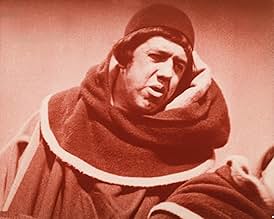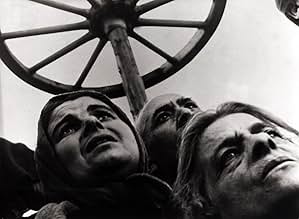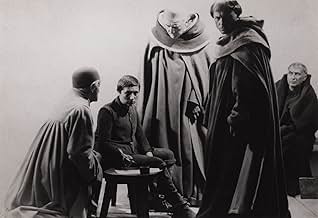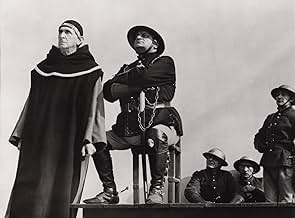In 1431, Jeanne d'Arc is placed on trial on charges of heresy, and the ecclesiastical jurists attempt to force her to recant her claims of holy visions.In 1431, Jeanne d'Arc is placed on trial on charges of heresy, and the ecclesiastical jurists attempt to force her to recant her claims of holy visions.In 1431, Jeanne d'Arc is placed on trial on charges of heresy, and the ecclesiastical jurists attempt to force her to recant her claims of holy visions.
- Director
- Writers
- Stars
- Awards
- 4 wins & 1 nomination total
Maria Falconetti
- Jeanne d'Arc
- (as Mlle Renée Falconetti)
Eugene Silvain
- Évêque Pierre Cauchon (Bishop Pierre Cauchon)
- (as Eugène Silvain)
Louis Ravet
- Jean Beaupère
- (as Ravet)
Armand Lurville
- Juge (Judge)
- (as André Lurville)
Jean Aymé
- Juge (Judge)
- (uncredited)
Gilbert Dacheux
- Juge (Judge)
- (uncredited)
Gilbert Dalleu
- Jean Lemaître
- (uncredited)
Paul Delauzac
- Martin Ladvenu
- (uncredited)
Dimitri Dimitriev
- Juge (Judge)
- (uncredited)
- Director
- Writers
- All cast & crew
- Production, box office & more at IMDbPro
Summary
Reviewers say 'The Passion of Joan of Arc' is celebrated for its innovative close-ups, emotional intensity, and pioneering silent film techniques. Renée Falconetti's performance is lauded for its subtlety and expressiveness. The film delves into themes of faith, power, and human spirit, contrasting Joan's purity with her accusers' corruption. Critics praise Dreyer's meticulous direction and the film's historical significance. Some find the silent format and close-ups challenging, yet it remains a landmark in cinematic achievement.
Featured reviews
What can one say about this work of art that has not been said many times before by those far better qualified to explain both it's importance and place as cinema and art? I shall not comment on the greatness of the film's technical achievements; the stunning cinematography, the production design, the brilliance of the screenplay based on actual transcripts from the trial, or the perfection of Mr. Dreyer's direction. The performance of Falconetti as Jeanne d' Arc has a profundity and depth far beyond my ability to illuminate. I suppose the best I can hope to do is to share my feelings, however inadequately expressed, of the effect it had on me. To say that it may be the greatest film ever made is to sound both obvious and trite. That a work of such beauty and simplicity, made seventy-six years ago can still have the power to move audiences in an era of multi-million dollar, hi-tech, bombastic over-wrought cinematic drivel is in itself a testament to the vision and genius of Carl Theodor Dreyer, Maria Falconetti and their collaborators. It is nourishment for those that hunger for something more in cinema, a feast for the soul. It is a reminder that film can indeed be art, and this film like all great works of art, lifts and transports us from the routine of our work-a-day lives to enable us, if only for a moment to experience the sublime. When viewing it we look at it as looking in a mirror. That is to say we look into ourselves. We question ourselves as to our own beliefs, or the lack thereof and the strength of spirit that enables an individual to endure the unendurable. Viewing it is a profound experience the nature of which for myself is transcendent rather than religious, because I am not in the least a religious person. Transcendent because it evokes emotions and thoughts that I cannot wholly account for, or adequately explain.
"La Passion of Jeanne d'Arc" is stark, radiant, exalted, simple, (but never simplistic), and ultimately sublime. The rest is silence.
"La Passion of Jeanne d'Arc" is stark, radiant, exalted, simple, (but never simplistic), and ultimately sublime. The rest is silence.
10judokid
I saw this a few months ago on the big screen, just after Nosferatu, another silent classic. Both showings were supported by a live organ play, which has been composed directly for the movie, and which suited perfectly. I had seen Nosferatu before, but i didn´t know anything about `Jeanne`, and so i was in no way prepared for this overwhelming, soul-rapturing experience.
My eyes were immediately glued to the screen. Unfortunately i had missed the first minutes, so it started for me with the first (?) court scene. The camera wandered through the faces of the court members, circled and focussed on Jeanne´s face. So beautiful, naked, strong and defenseless! I could rave on the technical perfection of this film, it´s clever editing, innovative and gorgeous cinematography, proper historical settings and pure storytelling. Carl Theodor Dreyer created a masterpiece. But the most outstanding feature of this silent are the performances; Maria Falconetti delivers simply the best performance of all times, and i can´t remember of any ´corny` overacting, which distracts most silent movies from the modern viewer, even the accepted classics. `La passion de Jeanne d´Arc´ is purest cinematic art, timeless in every sense.
My eyes were immediately glued to the screen. Unfortunately i had missed the first minutes, so it started for me with the first (?) court scene. The camera wandered through the faces of the court members, circled and focussed on Jeanne´s face. So beautiful, naked, strong and defenseless! I could rave on the technical perfection of this film, it´s clever editing, innovative and gorgeous cinematography, proper historical settings and pure storytelling. Carl Theodor Dreyer created a masterpiece. But the most outstanding feature of this silent are the performances; Maria Falconetti delivers simply the best performance of all times, and i can´t remember of any ´corny` overacting, which distracts most silent movies from the modern viewer, even the accepted classics. `La passion de Jeanne d´Arc´ is purest cinematic art, timeless in every sense.
Carl Dreyer's "The Passion of Joan of Arc" is a film that feels light years ahead of its time. Lean and mean, focusing its entire narrative on the interrogation of Joan that inevitably lead to her execution by burning at the stake, the film is kinetic in ways that most films even now aren't. Composed almost completely of tight close ups, Dreyer and crew cut rapidly between disconcerting, asymmetrical shots, giving the film a breathless, anxious, nearly frenzied pace.
Maria Falconetti gives an almost unbelievably intense performance as the title heroine. Her performance, and the film in general, does get a bit monotonous -- it exists primarily of impassioned gazes into the middle distance, giant, tearing eyes opened wide, an expression of passionate, nearly demented religious fervor on her face. It's not a film that concerns itself with characters and plot, so we don't get to know Joan as a person. It's difficult to care for her particular plight and we instead feel compassion for her as one human being feeling compassion for another. For that reason, the film left me remembering its striking images and formal style more than any emotions I might have felt while watching it. But it's no less of a remarkable cinematic achievement for that.
Grade: A
Maria Falconetti gives an almost unbelievably intense performance as the title heroine. Her performance, and the film in general, does get a bit monotonous -- it exists primarily of impassioned gazes into the middle distance, giant, tearing eyes opened wide, an expression of passionate, nearly demented religious fervor on her face. It's not a film that concerns itself with characters and plot, so we don't get to know Joan as a person. It's difficult to care for her particular plight and we instead feel compassion for her as one human being feeling compassion for another. For that reason, the film left me remembering its striking images and formal style more than any emotions I might have felt while watching it. But it's no less of a remarkable cinematic achievement for that.
Grade: A
Carl Th. Dreyer's The Passion of Joan of Arc was made, perhaps, years ahead of its time- my guess would be that if it wasn't burned after its initial release, it would've had as stunning an impact on the film world years down the line as Citizen Kane did. Though the use of close-ups and distorted angles were not completely new in this film, it felt like Dreyer was creating a new kind of cinema, one where reality, however cold and pitiful, was displayed with complete sincerity. There is also the editing (by Dreyer and Marguerite Beague), which has the timing that many directors/editors of the modern day could only hope to achieve (it has the influence of Eisenstein, only in a totally different historical context), and those moves with the camera by Rudolph Mate (who would go on to photograph Foreign Correspondent and Lady from Shanghai) that are precious- to call his work on the film extraordinary is an understatement.
And it was crucial for Dreyer to use the close-ups and tilted angles and shots where you only see the eyes in the bottom of the frame, and so forth- he's developing the perfect atmosphere in regards to a trial set in 15th century France. It's all those eyes, all those faces, holding all those stolid mindsets that send Joan to her fate. Pretty soon a viewer feels these presences from all these people, so strong and uncompromising, and Dreyer does a miraculous thing- he makes it so that we forget about the time and place, and all of our attention is thrown onto those eyes of Joan, loaded to brim with a sorrow for where she is, but an un-questionable faith in what she feels about God. I wondered at one point whether Dreyer was making as much a point on people's faiths and prejudices in the almighty, or just one on basic humanity.
There have been many before me who have praised Falconetti's performance to the heavens (Kael called it the finest performance in film), but in a way it almost can't be praised enough. What she achieves here is what Ebert must've felt watching Theron in the recent 'Monster'. I didn't even see her in a performance as Joan of Arc- I saw her as being the embodiment of it, as if Falconetti (with Dreyer's guidance) took Joan out of the pages of the trial transcript and her entire soul took over. There is something in an actor that has to be so compelling, so startling, and indeed so recognizable, that a person can feel empathy and/or sympathy for the person the actor's playing. All a viewer has to do is stare into Falconetti's eyes in any shot, close-up or not, and that viewer may get stirred to boiled-down emotion.
For me, it was almost TOO over-whelming an emotional experience- when Joan is about to get tortured, for example, I found myself completely lost from where I was watching the film, everything in my soul and being was with Joan in that chamber, and for a minute I broke out in tears. That's the kind of effect that Dreyer's craft and all the acting work (including Eugene Sylvain as the Bishop Cauchon, and of course Artaud as Jean) can have on a viewer. I'm not saying it has to, yet The Passion of Joan of Arc could- and should- be considered a milestone in cinematic tragedy, where the images that come streaming forth never leave a viewer, and the detail for time and place becomes just that, a detail for the main stage. Love Joan or hate her, this is for keeps.
And it was crucial for Dreyer to use the close-ups and tilted angles and shots where you only see the eyes in the bottom of the frame, and so forth- he's developing the perfect atmosphere in regards to a trial set in 15th century France. It's all those eyes, all those faces, holding all those stolid mindsets that send Joan to her fate. Pretty soon a viewer feels these presences from all these people, so strong and uncompromising, and Dreyer does a miraculous thing- he makes it so that we forget about the time and place, and all of our attention is thrown onto those eyes of Joan, loaded to brim with a sorrow for where she is, but an un-questionable faith in what she feels about God. I wondered at one point whether Dreyer was making as much a point on people's faiths and prejudices in the almighty, or just one on basic humanity.
There have been many before me who have praised Falconetti's performance to the heavens (Kael called it the finest performance in film), but in a way it almost can't be praised enough. What she achieves here is what Ebert must've felt watching Theron in the recent 'Monster'. I didn't even see her in a performance as Joan of Arc- I saw her as being the embodiment of it, as if Falconetti (with Dreyer's guidance) took Joan out of the pages of the trial transcript and her entire soul took over. There is something in an actor that has to be so compelling, so startling, and indeed so recognizable, that a person can feel empathy and/or sympathy for the person the actor's playing. All a viewer has to do is stare into Falconetti's eyes in any shot, close-up or not, and that viewer may get stirred to boiled-down emotion.
For me, it was almost TOO over-whelming an emotional experience- when Joan is about to get tortured, for example, I found myself completely lost from where I was watching the film, everything in my soul and being was with Joan in that chamber, and for a minute I broke out in tears. That's the kind of effect that Dreyer's craft and all the acting work (including Eugene Sylvain as the Bishop Cauchon, and of course Artaud as Jean) can have on a viewer. I'm not saying it has to, yet The Passion of Joan of Arc could- and should- be considered a milestone in cinematic tragedy, where the images that come streaming forth never leave a viewer, and the detail for time and place becomes just that, a detail for the main stage. Love Joan or hate her, this is for keeps.
10zeph-3
I saw this film for the very first time last week and was so tremendously captivated by it that I needed to share this rapture. The innovative camera-angles, the close-ups revealing pain and spirituality. It elevates the human condition and the Art of film. I would love to be able to go on into the whys or hows or technicalities. But my words couldn't do the film justice for the imagery still overwhelms me.
Did you know
- TriviaAfter completing the original cut of the film, director Carl Theodor Dreyer learned that the entire master print had been destroyed accidentally. With no ability to reshoot, Dreyer re-edited the entire film from footage he had originally rejected.
- GoofsIn the 15th century, a priest can be seen wearing a Jesuit robe. The Jesuit order was founded in the 16th century.
- Quotes
Jeanne d'Arc: Dear God, I accept my death gladly but do not let me suffer too long. Will I be with You tonight in Paradise?
- Alternate versionsIn the 1930s, a one-hour synchronized sound version was reissued under the name "The Immortal Saint" using David Ross as a narrator to replace intertitles.
- ConnectionsEdited into From Camille to Joan of Arc (1961)
- How long is The Passion of Joan of Arc?Powered by Alexa
Details
- Release date
- Country of origin
- Languages
- Also known as
- La pasión de Juana de Arco
- Filming locations
- Production company
- See more company credits at IMDbPro
Box office
- Gross US & Canada
- $21,877
- Opening weekend US & Canada
- $6,408
- Nov 26, 2017
- Gross worldwide
- $22,731
- Runtime
- 1h 50m(110 min)
- Color
- Sound mix
- Aspect ratio
- 1.33 : 1
Contribute to this page
Suggest an edit or add missing content


























